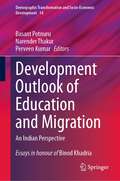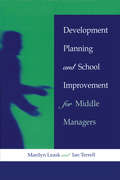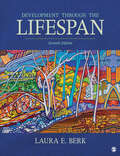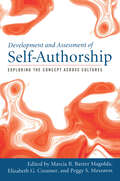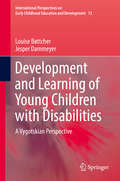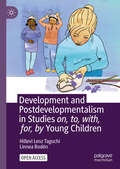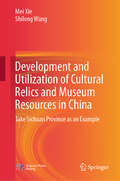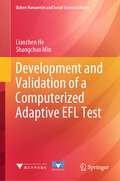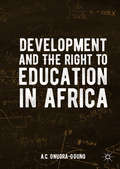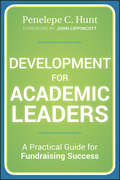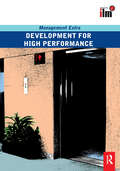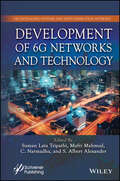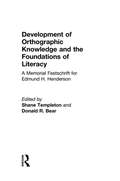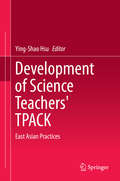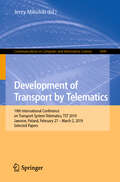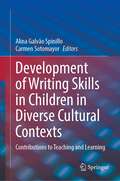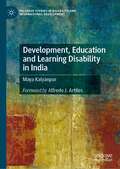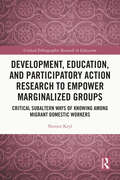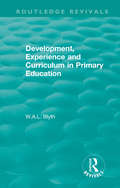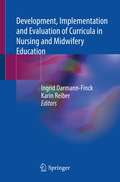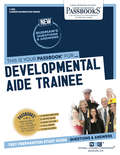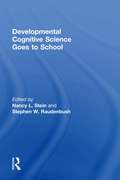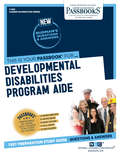- Table View
- List View
Development Of Prototype Tactile Instructional Materials In High School Geometry For Students With Vision Loss
by Allan Rosal MesogaResearcher: Allan Rosal Mesoga Title of Thesis: Development of Prototype Tactile Instructional Materials in High School Geometry for Students with Vision Loss Degree: Master of Arts in Education Specialization: Special Education (Teaching Children with Visual Impairment) Institution: College of Graduate Studies Philippine Normal University Advisers: Julieta A. Gregorio, Ph.D. Rosemarievic Villena-Diaz, Ph.D. Key Concepts: High School Geometry, Competencies, Vision Loss, Tactile Materials The purpose of this study is to develop prototype tactile instructional materials in High School Geometry for students with vision loss. Specifically, this study aimed to Develop and Content Validate the Prototype Tactile Instructional Materials in High School Geometry for Students with Vision Loss. To accomplish this, the study sought to achieve six objectives: (1) Analyze the content of the geometry skills in the Basic Education Curriculum (BEC) from kindergarten, from elementary up to secondary school, to determine their prerequisites, sequences, and levels of difficulty, (2) Analyze literature on mathematics tactile materials in advanced countries, (3) Identify the adaptations and modifications that can be incorporated into locally constructed materials for teaching geometry skills to blind students with vision loss in secondary school, (4) Develop prototypes of tactile instructional materials for selected geometry skills in the secondary school curriculum, (5) Establish the content validity of the prototype tactile instructional materials, and (6) Revise the prototype materials as needed and prepare the final tactile instructional materials for learners with visual loss in secondary school. The research for this study was carried out in two stages. The first stage focused on data gathering as well as on the preparation and validation of prototype tactile instructional material in geometry for students with vision loss. In the second stage, the prototype tactile instructional materials were revised, and the final copy of prototype tactile material was prepared. There are two (2) groups of respondents in this study. The first group consists of two (2) mathematics professors, one (1) special education professor, and one (1) special education teacher. Thus, the first group of respondents is made up of four (4) teachers, or experts. This group established the content validity of the prototype tactile instructional material in terms of the competencies set by the Department of Education. The second group of respondents is made up of nine (9) students with vision loss. This group established the content validity of the prototype tactile instructional material in Geometry as instructional materials for students with vision loss. The first group of respondents used the five (5) criteria for evaluating the prototype tactile instructional materials as adapted from the study of Cadiente (2006).
Development Outlook of Education and Migration: An Indian Perspective (Demographic Transformation and Socio-Economic Development #14)
by Basant Potnuru Narender Thakur Perveen KumarThis book describes the movement of un-skilled and skilled workers both within and from India and its fallout on education and development. It furthers the evidence on the contribution of education and international migration in development with specific reference to India as a major source country of migrant population. The book also distinguishes the underlying linkages and distinction between international and internal migration on the one hand and the education and development experience on the other. It brings forth the causes and development experiences of both migrations to a common platform to gauge on their similarities and differences in the lens of education and development. As such, this book contributes to the scant literature on Indian experience of internal and international migration and sheds light on future migration policy and course correction necessary for places and countries of migrant origin.
Development Planning and School Improvement for Middle Managers
by Marilyn Leask Ian TerrellClassroom teachers moving to positions of increased responsibility often have very little formal training for their new role. This book provides guidelines for best practice in the necessary skills for success - planning, management and accountability.
Development Through The Lifespan
by Laura E. BerkNow published by SAGE! With its seamless integration of up-to-date research, strong multicultural and cross-cultural focus, and clear, engaging narrative, Development Through the Lifespan, by best-selling author Laura E. Berk, has established itself as the market’s leading text. Known for staying current, the fully updated Seventh Edition offers the latest, most relevant research and applications in the field of human development. New and compelling topics, rich examples, coupled with Berk’s signature storytelling style, makes this edition the most accessible and engaging text available to students today. Included with this title: LMS Cartridge: Import this title’s instructor resources into your school’s learning management system (LMS) and save time. Don’t use an LMS? You can still access all of the same online resources for this title via the password-protected Instructor Resource Site. Learn more.
Development Through The Lifespan
by Laura E. BerkNow published by SAGE! With its seamless integration of up-to-date research, strong multicultural and cross-cultural focus, and clear, engaging narrative, Development Through the Lifespan, by best-selling author Laura E. Berk, has established itself as the market’s leading text. Known for staying current, the fully updated Seventh Edition offers the latest, most relevant research and applications in the field of human development. New and compelling topics, rich examples, coupled with Berk’s signature storytelling style, makes this edition the most accessible and engaging text available to students today. Included with this title: LMS Cartridge: Import this title’s instructor resources into your school’s learning management system (LMS) and save time. Don’t use an LMS? You can still access all of the same online resources for this title via the password-protected Instructor Resource Site. Learn more.
Development and Assessment of Self-Authorship: Exploring the Concept Across Cultures
by Marcia B. Baxter Magolda Elizabeth G. Creamer Peggy S. MeszarosThis book brings together new scholarship that expands and refines the concept of self-authorship across cultures. It adopts a constructive-developmental approach to self-evolution that emphasizes the interaction of personal characteristics and contextual influences on individuals’ construction of knowledge, identities, and relationships. Individual chapters cover subjects from populations as varied as Dutch students, male and female Bedouin and Jewish adolescents, African American male and female adolescents in economically depressed areas of the US, Latino/a college students grappling with ethnic identity and dissonance, Australian college females preparing to be childcare workers, and finally a comparative study of Japanese and U.S. college students’ epistemic beliefs.The book concludes by addressing questions about the challenges and opportunities involved in developing a valid measure of self-authorship that is less time and expertise-intensive than the in-depth one-on-one interview employed until now; and offering an outline of future theoretical and methodological research needed to further our understanding of self-evolution in general and self-authorship in particular.
Development and Learning of Young Children with Disabilities
by Louise Boettcher Jesper DammeyerThis book introduces current theories and research on disability, and builds on the premise that disability has to be understood from the dialectical dynamics of biology, psychology, and culture over time. Based on the newest empirical research on children with disabilities, the book overcomes the limitations of the medical and social models of disability by arguing for a dialectical biopsychosocial model. The proposed model builds on Vygotsky's cultural-historical ideas of developmental incongruence, implying that the disability emerges from the misfit between individual abilities and the cultural-historical activity settings in which the child with impairments participates. The book is a theoretical contribution to an updated understanding of disability from a psychological and educational perspective. It focuses on the first years of the life of the child with impairment, and travels through infancy, toddler, preschool and early school age, to track the developmental trajectories of disability through the dialectical processes of cultural, social, individual, and biological processes. It discusses a number of themes that are relevant for the early development and support for children with various types and degrees of disability through the lens of Vygotsky's cultural-historical developmental theories. Some of the themes discussed are inclusion, mental health, communication, aids and family life.
Development and Postdevelopmentalism in Studies on, to, with, for, by Young Children
by Hillevi Lenz Taguchi Linnea BodénThis open access book directs its attention to a desire for inter- and transdisciplinary, reciprocal collaborations in studies concerning young children. It focuses on the possibilities and obstacles in collaborative forms of inquiry involving those stakeholders and actors whom the research concerns, specifically the participating children. The backdrop of the discussions and theoretical investigations is the inter- and transdisciplinary project Enhancing Children’s Attention. Within the framework of an evidence-based intervention, this project performed multiple qualitative forms of inquiry, including emergent forms of collaborations with children. The book provides a discussion on how young children’s development, learning, and lives are understood in the developmental sciences, and in the humanities and social sciences. It specifically addresses scholars interested in postdevelopmental, posthumanist, new materialist, and postqualitative approaches. The book proposes a displaced form of postdevelompentalism for future collaborative forms of inquiry with a focus on multiple forms of knowledge and knowing.
Development and Utilization of Cultural Relics and Museum Resources in China: Take Sichuan Province as an Example
by Shilong Wang Mei XieThis book offers fresh critical insights to the field of cultural and museum resources, aiming to explore its transformation and utilization from the cultural value theory. This book for the first time examines the current situation of cultural and museum resources in Sichuan province and proposes that museum cultural creative industries are a new development trend. The content is divided into four sections but interrelated sections to highlight the importance and rationalities of the utilization of cultural and museum resources in Sichuan province. It begins with an exploration of the current situation of cultural and museum resources. This is followed by a section that illustrates the existing issues in the process of its utilization. Lastly, it reveals the influencing factors, experiences, and value of utilization of cultural and museum resources. This book is extremely useful to readers in museums, cultural heritage, and cultural policies studies, cultural industries not just it offers substantive content on museum knowledge, but also because it offers conceptual tools for studying Chinese museum cultural creative industries from a different perspective and re-discusses the relationship between utilization (commercial value) and protection (archaeological value) of museums, and provides some suggestions for policymakers and museum managers.
Development and Validation of a Computerized Adaptive EFL Test (Qizhen Humanities and Social Sciences Library)
by Lianzhen He Shangchao MinThe book reports on the development and validation of a computerized adaptive EFL test, which is used as an exit requirement for non-English-major undergraduates at a major Chinese university. Unlike the tests reported in previous research on computerized adaptive language test (CALT), which were mostly designed to assess vocabulary, grammar and reading, this test consists of listening and reading components using both dichotomously-scored stand-alone items and polytomously-scored testlet-based items. The book is an essential and stimulating read for researchers and graduate students in the testing domain, particularly for those who are interested in CALT, item response theory (IRT), and quantitative research methods in general. It also constitutes a solid reference resource for L2 teachers and test developers. One of the distinctive features of the book is its operationalization of assessment use argument (AUA) in the investigation of the construct validity of the CALT. Another strength of this book is that it provides insight into the specific procedures that are followed in the development of CALTs and addresses a few key issues, such as local item dependence and DIF detection that were ignored in previous CALT development research.
Development and the Right to Education in Africa
by A.C. Onuora-OgunoThis book is about the right to basic education and its impact on development in Africa. It focuses on the elusive subject of litigating the right to education by examining jurisprudence from select African countries and India. The project further analyses the various challenges that impede access to education, with the attendant lack of political will to curb corruption, and calls for the building of strong institutions and the involvement of both state and non-state actors in driving development via education. It also covers the scope for legal practitioners and policy makers, and supports institutional framework in realizing the right to basic education.
Development for Academic Leaders
by Penelepe C. HuntFundraising is an increasingly important responsibility for academic leaders, from department chairs to deans and on up into the executive ranks in higher education. In this concise, practical guide, Penelepe Hunt (professional fundraiser, teacher, management consultant, and executive coach) shows the vital role that academic leaders play in raising funds. She explains how leaders can learn the skills to become effective at networking, entrepreneurial, and productive fundraisers. Hunt also breaks down fundraising in a way that clarifies roles, responsibilities, programs, activities, politics, sources, and process--everything an academic leader needs to know in order to succeed in development activities.
Development for High Performance Revised Edition: Revised Edition (Management Extra Ser.)
by ElearnManagement Extra brings all the best management thinking together in one package. The series fuses key ideas with applied activities to help managers examine and improve how they work in practice. Management Extra is an exciting, new approach to management development. The books provide the basis for self-paced learning at level 4/5. The flexible learning structure allows busy participants to study at their own convenience, minimising time away from the job. The programme allows trainers to quickly plan and deliver high quality, business-led courses. Trainers can select materials to meet the needs of their delegates, clients, and budget. Each book is divided into themes of ideal length for delivering in a training session. Each theme has a range of activities for delegates to complete, putting the training into context and relating it to their own situation and business. The books’ lively style will stimulate further interest in the subjects covered. Guides for further reading and valuable web references provide a lead-in to further research. Management Extra is based on the NVQ framework to ease the creation of Diploma, Post Graduate Diploma or NVQ programmes for managers. It is accredited with all leading awarding bodies.
Development of 6G Networks and Technology (Next Generation Computing and Communication Engineering)
by Suman Lata Tripathi Mufti Mahmud S. Albert Alexander C. NarmadhaThis book provides an in-depth exploration of the potential impact of 6G networks on various industries, including healthcare, agriculture, transport, and national security, making it an essential resource for researchers, scholars, and students working in the field of wireless networks and high-speed data processing systems. Development of 6G Networks and Technology explores the benefits and challenges of 5G and beyond that play a key role in the development of the next generation of internet. 6G is targeted to improve download speeds, eliminate latency, reduce congestion on mobile networks, and support advancements in technology. 6G has the potential to transform how the human, physical, and digital worlds interact with each other and the capability to support advancements in technology, such as virtual reality (VR), augmented reality (AR), the metaverse, and artificial intelligence (AI). Machine learning and deep learning modules are also an integral part of almost all automated systems where signal processing is performed at different levels. Signal processing in the form text, image, or video needs large data computational operations at the desired data rate and accuracy. Large data requires more use of IC area with embedded bulk memories that lead to power consumption. Trade-offs between power consumption, delay, and IC area are always a concern of designers and researchers. Energy-efficient, high-speed data processing is required in major areas like biomedicine and healthcare, agriculture, transport, climate change, and national security and defense. This book will provide a foundation and initial inputs for researchers, scholars, and students working in the areas of wireless networks and high-speed data processing systems. It also provides techniques, tools, and methodologies to develop next-generation internet and 6G.
Development of Orthographic Knowledge and the Foundations of Literacy: A Memorial Festschrift for edmund H. Henderson
by Shane Templeton Donald R. BearThis volume unites spelling and word recognition -- two areas that have largely remained theoretically and empirically distinct. Despite considerable advances in the investigation of processes underlying word perception and the acknowledgement of the seminal importance of lexical access in the reading and writing processes, to date the development and functioning of orthographic knowledge across both encoding and decoding contexts has rarely been explored. The book begins to fill this void by offering a coherent and unified articulation of the perceptual, linguistic, and cognitive features that characterize an individual's advancing word/orthographic knowledge, providing evidence for a common knowledge base underlying spelling in writing and word recognition in reading. From a developmental perspective, the studies and syntheses presented in this volume blend insights from psychology and language study with those from clinical and classroom observations. These insights help explain how individuals, from preschool through adolescence, develop knowledge of the orthographic system underlying word structure in English and how they apply this knowledge in actual writing and reading contexts. Implications are drawn for the assessment and teaching of spelling, vocabulary, and word analysis from primary through middle grades.
Development of Science Teachers' TPACK
by Ying-Shao HsuScience is a subject matter that requires learners to explore the world and develop their own abilities on the basis of that exploration. As technology broadens and deepens, science teachers need to expand their Technological Pedagogical Content Knowledge (TPACK), which determines how well they use technology to help students learn science. The book details our efforts to prepare science teachers to teach with the help of technology, examining various aspects of teacher education, professional development and teaching material preparation. It consists of three parts, which focus on: how TPACK is conceptually constructed within the field of science education, how teacher evaluation and teaching materials are developed and utilized based on the transformative model and how science teachers are prepared and supported with electronic resources based on the integrative model. The book offers a valuable resource for all those working in science education, as well as those readers who are interested in teacher education. Science teachers will come to know how simulations and animations can pedagogically support student learning. Practices for teachers' TPACK development such as learning-by-design, evaluation and measurement and teacher communities are also addressed, applied and discussed in the case of science teachers. The individual chapters will provide teacher educators and researchers from all disciplines with new insights into preparing teachers for the Digital Era.
Development of Transport by Telematics: 19th International Conference on Transport System Telematics, TST 2019, Jaworze, Poland, February 27 – March 2, 2019, Selected Papers (Communications in Computer and Information Science #1049)
by Jerzy MikulskiThis book constitutes selected papers from the 19th International Conference on Transport Systems Telematics, TST 2019, held in Jaworze, near Bielsko-Biala, Poland, in March 2019. The 31 full papers presented in this volume were carefully reviewed and selected from 104 submissions. They were organized in topical sections named: telematics in rail transport; telematics in road transport; telematics in marine transport; telematics in air transport; and general about telematics.
Development of Writing Skills in Children in Diverse Cultural Contexts: Contributions to Teaching and Learning
by Alina Galvão Spinillo Carmen SotomayorThis book brings together multiple theoretical perspectives and disciplinary approaches to study the acquisition and development of written language by children as well as the implications for teaching and learning of writing practices in a variety of languages and cultural contexts. Chapters in this contributed volume present both theoretical contributions and results of research carried out with students and teachers from 11 countries (Belgium, Brazil, Chile, Israel, Italy, Mexico, the Netherlands, Portugal, Spain, UK and USA) who speak seven different languages: Portuguese, Spanish, English, Italian, French, Dutch and Hebrew. By bringing together research developed in diverse cultural contexts it enriches the debates in the interdisciplinary field of writing studies by analyzing a wide range of topics at the interface between research and educational implications for the teaching and learning of writing by children. The book consists of five parts, each one addressing a specific set of topics. Part I presents studies on topics related to written language representation systems (phonological and morphological awareness) and on the relationship between grammar and the quality of texts of different genres. Part II includes studies related to compositional processes of writing texts, and the factors involved in these processes. Part III focuses on the difficulties faced by students during the acquisition and development of writing. Part IV is dedicated to chapters that discuss and compare writing practices in different social environments. Finally, chapters in part V deal with teaching and learning of writing in the school setting. Development of Writing Skills in Children in Diverse Cultural Contexts: Contributions to Teaching and Learning will be of interest to researchers and students in the fields of psychology, education and linguistics, as well as to other social scientists in the broader interdisciplinary field of writing studies.
Development, Education and Learning Disability in India (Palgrave Studies in Disability and International Development)
by Maya KalyanpurThis book uses qualitative research methods to examine why students in an Indian context are being identified as having learning disabilities on criteria that are largely drawn from the context of the Global North. It explores the push towards English language instruction as a possible factor that affects poor academic outcomes for students from low-income backgrounds who may be first-generation learners or English language learners. The book contrasts the different outcomes and supports for academically struggling students across low-income and middle-income backgrounds, with evidence to suggest that, despite the inclusionary principles of Education For All, this label is creating a marginalized group of students.
Development, Education, and Participatory Action Research to Empower Marginalized Groups: Critical Subaltern Ways of Knowing among Migrant Domestic Workers (Critical Ethnographic Research in Education)
by Shireen KeylDrawing on a rich variety of participatory action research (PAR) methods including ethnographic observation, artefact collection, focus groups, and interviews, this volume explores the transformational potential of development programs which actively involve marginalized groups. Foregrounding the experiences of female migrant workers in Beirut, the text reveals how direct participation in NGO-led, community programs and education empowers women to create counter-cultural communities and spaces for learning and activism. The text ultimately combines aspects of critical pedagogy, spatial analysis, and third world feminisms to propose a subaltern praxis for research, development, and teaching. It will appeal to scholars and researchers with interests in research methods in education, migration, equality and human rights and the anthropology of education.
Development, Experience and Curriculum in Primary Education (Routledge Revivals)
by W.A.L. BlythOriginally published in 1984, this book considers the ever-increasing pressure that teachers are under both to demonstrate and maintain their professional understanding and competence. Curriculum development has long been the subject of scrutiny, with some authorities arguing that the primary curriculum should be a diluted version of the secondary curriculum. Professor Blyth presents a convincing case for a primary curriculum carefully constructed to enhance the relationship between the various aspects of the child’s development and total experience. Initially examining how children in the primary age range do develop and experience the world, the book goes on to consider the implications of this for shaping the curriculum. These are traced through different aspects of the primary curriculum, from physical, moral and aesthetic development to an understanding of the social world. The book concludes with an assessment of this approach to primary education within an international context and prospects for the future. An important work by a leading authority, Development, Experience and Curriculum in Primary Education is a guide to the professional development of primary teachers, building on their experience and judgement.
Development, Implementation and Evaluation of Curricula in Nursing and Midwifery Education
by Ingrid Darmann-Finck Karin ReiberThis book provides a review of central contributions from a variety of countries, and is intended to enhance and expand the national professional dialogue on curricula in nursing and midwifery education. All questions of a general nature related to the topic of “curricula” are dealt within the framework of this internationally oriented anthology. Though the contributions may address challenges concerning curriculum work in a specific country, they have been selected and structured to ensure their applicability to other countries. The book’s main goals are to highlight the various phases and aspects of curriculum development and to offer a broad international perspective on the topic. It provides an overview of the international status quo of the theory development and seeks to promote an ongoing international discussion and cooperation in curriculum work in nursing and midwifery education. When there are major changes in nursing and midwifery care, nursing (and midwifery) education has to change, too. Curricula offer an important basis for shaping educational processes at vocational schools and universities. The discussion of nursing and midwifery curricula is currently primarily taking place at the national level. The book shows that the approaches and instruments used in the development, construction, implementation and evaluation of curricula in nursing and midwifery education in different countries relate to very similar theoretical foundations. This finding can be seen as a confirmation of the national approaches. Although the book chiefly focuses on nursing education, examples from midwifery education are also included, so as to foster international and interprofessional cooperation.
Developmental Aide Trainee: Passbooks Study Guide (Career Examination Series #C-856)
by National Learning CorporationThe Developmental Aide Trainee Passbook® prepares you for your test by allowing you to take practice exams in the subjects you need to study. It provides hundreds of questions and answers in the areas that will likely be covered on your upcoming exam, including but not limited to; Dealing with daily situations in an OMH/OMRDD setting; Observing and recording situations of daily living; Understanding and applying written instructional material; Arithmetic for daily living; and more.
Developmental Cognitive Science Goes to School
by Stephen W. Raudenbush Nancy L. SteinThis book addresses core issues related to school learning and the use of developmental/cognitive science models to improve school-based instruction. The contributors comprise a veritable "who's who" of leading researchers and scientists who are broadly trained in developmental psychology, cognitive science, economics, sociology, statistics, and physical science, and who are using basic learning theories from their respective disciplines to create better learning environments in school settings. Developmental Cognitive Science Goes to School: presents evidence-based studies that describe models of complex learning within specific subject-area disciplines focuses on domain knowledge and how this knowledge is structured in different domains across the curriculum gives critical attention to the topic of the ability to overcome errors and misconceptions addresses models that should be used to begin instruction for populations of children who normally fail at schooling. This is a must-read volume for all researchers, students, and professionals interested in evidence-based educational practices and issues related to domain-specific teaching and learning.
Developmental Disabilities Program Aide: Passbooks Study Guide (Career Examination Series)
by National Learning CorporationThe Developmental Disabilities Program Aide Passbook® prepares you for your test by allowing you to take practice exams in the subjects you need to study. It provides hundreds of questions and answers in the areas that will likely be covered on your upcoming exam, including but not limited to; Dealing with daily situations in an OMH/OMRDD setting; Observing and recording situations of daily living; Understanding and applying written instructional material; Arithmetic for daily living; and more.

